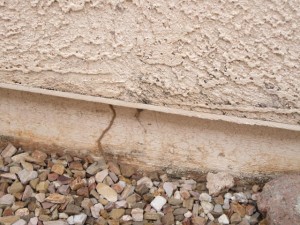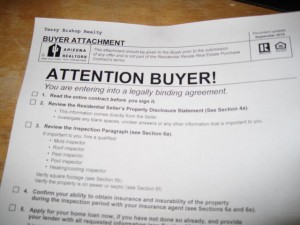What Happens If Someone Defaults?
November 5th, 2015 What happens if either the buyer or the seller fails to comply with the terms and conditions of the contract? The Arizona Association of Realtors® purchase contract makes provisions.
What happens if either the buyer or the seller fails to comply with the terms and conditions of the contract? The Arizona Association of Realtors® purchase contract makes provisions.
There is a “cure period” which is a three day period in which the party which defaults has to “cure” that default. The party which has been breached sends a “cure notice” to the breaching party stating they have three days in which remedy the default. If the non-complying party continues the default, breach of contract is assumed. The non-breaching party can request all earnest money as liquidated damages and may cancel the contract. The non-breaching party may also bring action against the party who has breached the contract through mediation and arbitration.
Provision is made for alternative dispute resolution and all mediation costs are to be paid equally between both parties. Unresolved issues will be submitted to binding arbitration and both parties will agree on the arbitrator in accordance with the American Association of Arbitration Rules for the Real Estate Industry. The decision of the arbitrator is final.
However, if parties do not want to go to binding arbitration where the judgment is non appealable, they may elect to go to court action within 30 days after the mediation conference.
Any action by the US Government such as Internal Revenue, Small Claims Court, Judicial or Non Judicial foreclosure or any lis pendens does not constitute a breach and are excluded from the Alternative Dispute Resolution. In the event that legal action is undertaken, the prevailing party has the attorney’s fees paid by the non-prevailing party.
Section 8 consists of 29 blank lines in which any additional terms and conditions of the contract can be written. If the buyer desires something to be removed from the property such as a pile of bricks, the agent would specify “bricks at northeast corner of property to be removed from property and area to be landscaped so bare ground is not visible,” or something to that effect.
When we think about real property, we know nature can take her toll. Between the contract acceptance and close of escrow, if there is a loss to the property, such as a tree falling on the house, and the damage exceeds ten per cent or more, either the buyer or seller may cancel the contract. If it is less than ten percent, the damage must be fixed and the terms of the contract can be enforced.
The price of the property is public record and the contract reiterates that. The contract is governed by Arizona law and time is of the essence. The parties, including the Realtors® must act in a diligent manner.
Compensation to the parties is through a separate agreement, usually the Exclusive Right to Sell, otherwise known as the Listing Agreement. If the buyer is paying his/her own commission, funds are to be collected at the close of escrow.
Copies and counterparts include faxed copies, Xeroxed copies, e mailed copies, other electronic type copies and generally electronic signatures are acceptable. The only form where counterpart signatures are unacceptable is the Lead Based Paint form. All signatures must be on the same form.
All days are calendar days and begin at 12 midnight, ending at 11:59 pm. If we signed something on Tuesday, the counting of the days will begin Wednesday at 12 midnight. If close of escrow is Friday, and signing must be three days prior to close of escrow, that signing must take place on Monday. Tuesday would count as the third day, Wednesday, the second day and Thursday the day before close of escrow.
The contract must be read in its entirety and include any addenda. The buyer has the right to accept subsequent offers but any subsequent offer is a backup offer and will only go into first position if the primary offer is cancelled.
If a party wishes to cancel the contract, this may be done by writing stating the notice for cancellation and delivering the notice to the Escrow Company as well as the other party. Delivery of notice can be by hand delivery, faxed, sent by electronic mail, or by overnight courier service.
Earnest money will be made out to the Escrow Company and should not be cash. The form of earnest money will be described such as personal check, cashier’s check, money order, etc., and the place of deposit is identified.
The seller and the buyer are indemnifying the brokers for anything they can discover about the property during the inspection period and this includes loans, insurances, or other investment information.
The last section of the contract identifies when acceptance by the seller is to occur. Until acceptance, the buyer has the right to cancel the contract.
The signatory page identifies all parties to the contract, the buyer, the seller, the buyer’s agent, and the seller’s agent. If a counter offer is to be issued, the seller will indicate that on the signatory page. If the seller rejects the offer, provision is made for that condition also.
Contract documents change from time to time and are not cast in stone. The Arizona Association of Realtors® and the forms committee has spent many hours laboring over this document and other documents which are made a part of the transaction. I have attempted to explain this contract so that you understand what you are signing.





